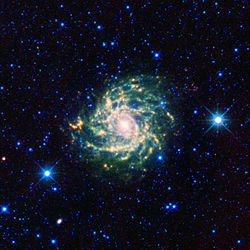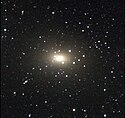Maffei-Gruppe
Die Maffei-Gruppe, Maffei-1-Gruppe oder IC-342/Maffei-Gruppe oder auch LGG 104 ist mit einer Entfernung von rund 10 Millionen Lichtjahren die der Lokalen Gruppe nächstgelegene Galaxiengruppe.
Ihre hellsten Mitglieder sind Maffei 1, eine elliptische Riesengalaxie oder linsenförmige Galaxie im Sternbild Kassiopeia, und IC 342, eine Spiralgalaxie vom Typ SAB(rs)cd im Sternbild Giraffe. Die Galaxie Maffei 2 wird inzwischen ebenfalls zu ihr gezählt. Insgesamt werden der Gruppe derzeit 24 Mitglieder zugerechnet.[1][2] Die Galaxien Maffei 1 und Maffei 2 liegen in der von der Milchstraße verdeckten Zone und wurden erst 1968 durch Auswertung von Infrarotaufnahmen von dem italienischen Astronomen Paolo Maffei entdeckt.
Mitglieder
| Name | Typ[3] | Rek. (J2000)[3] | Dek. (J2000)[3] | Rotversch. (km/s)[3] | scheinb. Hell.[3] | Untergruppe[2] |
|---|---|---|---|---|---|---|
| Camelopardalis A | Irr | 04h 26m 16,3s | +72° 48′ 21″ | −46 ± 1 | 14,8 | IC 342 |
| Camelopardalis B | Irr | 04h 53m 07,1s | +67° 05′ 57″ | 77 | 16,1 | IC 342 |
| Camelopardalis D | Im | 05h 59m 42s | +73° 26′ 00″ | +93 | 17,1 | IC 342 |
| Cassiopeia 1 | dIrr | 02h 06m 02,8s | +68° 59′ 59″ | 35 | 16,4 | IC 342 |
| Cassiopeia 3 | Im | 01h 07m 30s | +51° 26′ 00″ | −166 | 17,1 | IC 342 |
| IC 342 | SAB(rs)cd | 03h 46m 48,5s | +68° 05′ 46″ | 31 ± 3 | 9,1 | IC 342 |
| KK 35 | Irr | 03h 45m 12,6s | +67° 51′ 51″ | 105 ± 1 | 17,2 | IC 342 |
| NGC 1560 | SA(s)d | 04h 32m 49,1s | +71° 52′ 59″ | −36 ± 5 | 12,2 | IC 342 |
| NGC 1569 | Sbrst | 04h 30m 49,1s | +64° 50′ 52.6″ | −104 ± 4 | 11,2 | IC 342 |
| UGC 2773 | Im | 02h 32m 06s | +47° 48′ 00″ | 83 | 14,3 | |
| UGCA 86 | Im | 03h 59m 50,5s | +67° 08′ 37″ | 67 ± 4 | 13,5 | IC 342 |
| UGCA 92 | Im | 04h 32m 04,9s | +63° 36′ 49.0″ | −99 ± 5 | 13,8 | IC 342 |
| UGCA 105 | Im | 05h 14m 15,3s | +62° 34′ 48″ | 111 ± 5 | 13,9 | IC 342 |
| Mailyan 16 | Im | 06h 47m 48s | +80° 07′ 00″ | −157 | 16,4 | IC 342 |
| Dwingeloo 1 | SB(s)cd | 02h 56m 51,9s | +58° 54′ 42″ | 110 | 13,1[4] | Maffei 1 |
| Dwingeloo 2 | Im | 02h 54m 08,5s | +59° 00′ 19″ | 94 ± 1 | 20,5 | Maffei 1 |
| KKH 6 | Im | 01h 34m 54s | +52° 06′ 00″ | −141 | 17,0 | Maffei 1 |
| KKH 11 | dE | 02h 24m 34,2s | +56° 00′ 43″ | 310 | 16,2 | Maffei 1 |
| KKH 12 | Irr | 02h 27m 26,9s | +57° 29′ 16″ | 70 | 17,8 | Maffei 1 |
| Maffei 1 | S0 pec | 02h 36m 35,4s | +59° 39′ 19″ | 13 ± 22 | 11,4 | Maffei 1 |
| Maffei 2 | SAB(rs)bc | 02h 41m 55,1s | +59° 36′ 15″ | −17 ± 5 | 16,0 | Maffei 1 |
| MB 1 | SAB(s)d | 02h 35m 36,5s | +59° 22′ 43″ | 190 ± 1 | 20,5 | Maffei 1 |
| MB 2 | dIrr | 02h 36m 59,8s | +59° 14′ 14″ | 18 | ||
| MB 3 | dSph | 02h 55m 42,7s | +58° 51′ 37″ | 59 ± 1 | 19,8 | Maffei 1 |
Karte
Siehe auch
- M83-Gruppe
- M81-Gruppe
- Sculptor-Gruppe
- Struktur des Kosmos
- Canes-Venatici-I-Gruppe
- Position der Erde im Universum
- Lokale Gruppe
Weblinks
- Atlas of the universe: The Maffei Group
Einzelnachweise
- ↑ Buta, Ronald J.; McCall, Marshall L.: The IC 342/Maffei Group Revealed. In: The Astrophysical Journal Supplement Series, Volume 124, Issue 1, S. 33–93, 09/1999, bibcode:1999ApJS..124...33B
- ↑ a b Karachentsev, I. D.: The Local Group and Other Neighboring Galaxy Groups. In: The Astronomical Journal, Volume 129, Issue 1, S. 178–188, 01/2005. bibcode:2005AJ....129..178K
- ↑ a b c d e NASA/IPAC Extragalactic Database. In: Results for various galaxies. Abgerufen am 30. Dezember 2006.
- ↑ Ronald J. Buta, Marshall L. McCall: The IC 342/Maffei Group Revealed. In: The Astrophysical Journal Supplement Series. Band 124, Nr. 1, September 1999, ISSN 0067-0049, S. 33–93, doi:10.1086/313255 (iop.org).
Auf dieser Seite verwendete Medien
Autor/Urheber: CWitte, Lizenz: CC BY-SA 3.0
Lokale Gruppe 3D Nachbarschaft. SVG-Version von Image:Lokale Gruppe 3D Nachbarschaft.png+ Details: Die Galaxienhaufen in der Umgebung der Lokalen Gruppe als 3D-Diagramm. Selbst erstelltes Diagramm aus Rohdaten
A leggy cosmic creature comes out of hiding in this new infrared view from NASA's Wide-field Infrared Survey Explorer, or WISE. The spiral beauty, called IC 342 and sometimes the "hidden galaxy", is shrouded behind our own galaxy, the Milky Way. Stargazers and professional astronomers have a hard time seeing the galaxy through the Milky Way's bright band of stars, dust and gas. WISE's infrared vision cuts through this veil, offering a crisp view.
In a spiral galaxy like IC 342, dust and gas are concentrated in the arms. The denser pockets of gas trigger the formation of new stars, as represented here in green and yellow. The core, shown in red, is also bursting with young stars, which are heating up dust. Stars that appear blue reside within our Milky Way, between us and IC 342.
This galaxy has been of great interest to astronomers because it is relatively close. However, determining its distance from Earth has proven difficult due to the intervening Milky Way. Astronomer Edwin Hubble first thought the galaxy might belong to our own Local Group of galaxies, but current estimates now place it farther away, at about 6.6 to 11 million light-years.
This image was made from observations by all four infrared detectors aboard WISE. Blue and cyan represent infrared light at wavelengths of 3.4 and 4.6 microns, which is primarily light from stars. Green and red represent light at 12 and 22 microns, which is primarily emission from warm dust.Autor/Urheber: Richard Powell, Lizenz: CC BY-SA 2.5
The Nearest Groups of Galaxies
Maffei 1 (UGCA 34) elliptical galaxy







